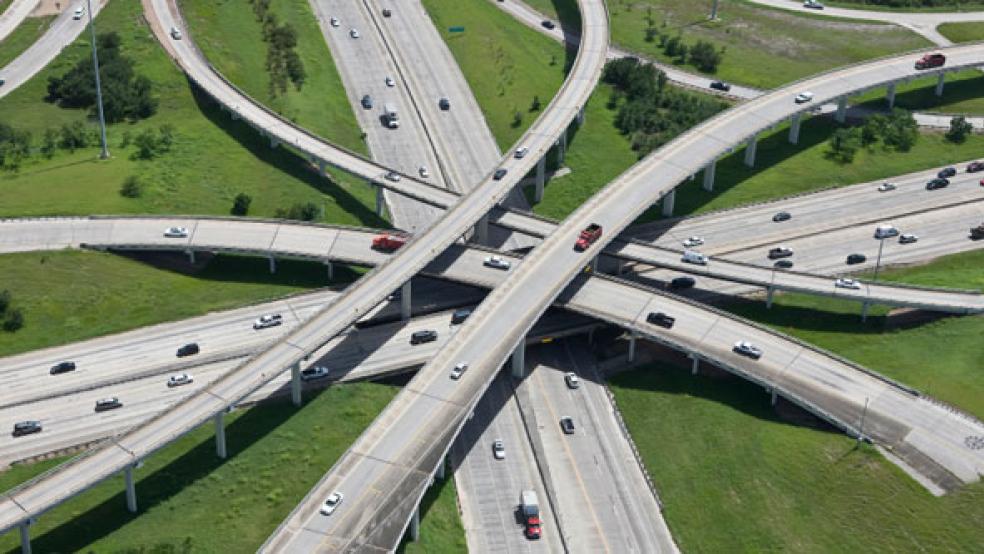For a fleeting moment last month, it looked as if Republican and Democratic lawmakers had gotten their act together and would pass a new six-year highway spending bill -- one that would provide state and local officials with some certainty of funding their long-term highway, bridge and mass transit programs.
But agreeing on precisely how to replenish the near bankrupt Federal Highway Trust Fund and allow the nation to get on with addressing its pressing infrastructure needs once again appears beyond the reach of the Republican-controlled Congress.
Related: Why Congress Can’t Make a Deal on Highway Spending
With a July 31 deadline looming and no consensus in sight, the House on Wednesday voted 312 to 119 to adopt an $8 billion stop-gap measure that would continue funding highway and bridge construction through Dec. 18 – shortly before Christmas. Lawmakers are renowned for having kicked this transportation issue down the road repeatedly. This would be the 34th extension of the old transportation legislation over the past six years.
The short-term extension or patch would be funded through yet another round of creative or fantasy budgeting gimmicks. Congress has become quite adroit at funding highway, defense and other programs without raising taxes or making offsetting cuts elsewhere in the budget – and this bill is no different.
One gimmick in the House-passed highway bill calls for revisions to the Internal Revenue Service rules that would force mortgage companies to obtain more financial information from borrowers and cut back on inaccurate reporting. Another clarifies the statute of limitations on reassessing certain tax returns.
Related: Senators Move Towards a Big Infrastructure Deal
Those two provisions alone would offset about $3 billion of the $8 billion total cost of temporarily extending the highway program, according to a House summary of the legislation.
Another provision would extend the current budget treatment of Transportation Security Administration fees as “mandatory savings” through 2026. This arcane bookkeeping measure would have the effect of reducing government “outlays” by $3.1 billion – with those savings going to the highway program.
House Ways and Means Committee Chair Paul Ryan (R-WI) and House Transportation and Infrastructure Committee Chair Bill Shuster (R-PA) – said the latest spending patch would buy time for Congress to agree on a major reform of the tax code – one that would generate tens of billions of dollars to underwrite future highway projects.
Ryan is working with Sens. Chuck Schumer (D-NY) and Rob Portman (R-OH) on an idea for a one-time tax on cash and assets currently being parked overseas by U.S. multi-national corporations to be used to fund a multi-year transportation program. This corporate tax “repatriation” idea enjoys the backing of the Obama administration, although there is substantial disagreement over how to structure it.
Related: How Tax Reform Could Help Save U.S. Infrastructure
Business and transportation advocates, along with some lawmakers and conservative think tanks have proposed raising the 18.4 cents per gallon federal gasoline tax as a solution for the looming $10 billion shortfall in the current fiscal year, often noting that the tax hasn’t been increased once during the past two decades.
However, House Speaker John Boehner (R-OH), Senate Majority Leader Mitch McConnell (R-KY), many lawmakers from the Midwest and Southwest and anti-tax groups are all opposed to a boost in the gasoline tax, even while alternative approaches to raising money through corporate tax reform is complex and highly controversial.
What’s more, McConnell and other Senate GOP leaders say they aren’t giving up on passing a transportation package within the next couple of weeks that would carry the nation beyond the 2016 election.
Related: Deadlock Over Highway Spending Could Stall Economy
Senate Republicans stressed yesterday that they won't settle for the short-term highway patch the House passed, and are still interested in a multi-year bill before Congress departs for a long August recess.
Finance Chairman Orrin Hatch (R-UT) told reporters that Republicans had carved out enough money to pay for about five years’ worth of highway funding.
"We're both going at it as best we can, and then ultimately we've got to resolve it, between the House and Senate," Hatch told reporters "And I think we will."





